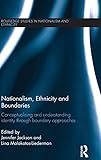Nationalism, Ethnicity and Boundaries : Conceptualising and understanding identity through boundary approaches
Contributor(s): Jackson, Jennifer | Liederman, Lina Molokotos.
Series: Routledge Studies in Nationalism and Ethnicity. Publisher: New York Routledge 2015Description: xii, 252p.ISBN: 9780415857437.Subject(s): Nationalism--Social aspects -- Boundaries--Social aspect -- Ethnicity--Social aspectsDDC classification: 320.54 Summary: Nationalism and ethnicity have become, across time and space, a force in the construction of boundaries. This book analyses geographical and physical borders and symbolic, political and socio-economic boundaries, and how they impact upon nationalism and ethnic identity. Geographic and other tangible borders are critical components in the making and unmaking of boundaries. However, symbolic or intangible boundaries along national, ethnic, political or socio-economic criteria are equally significant. Organised into three sections on theory, national and transnational case studies, this book both introduces existing approaches to the study of boundaries and illustrates how it is possible to apply renewed boundary approaches to better understand nationalism and ethnicity in contemporary contexts. Expert contributors in the field present detailed case studies on the UK, Israel, Estonia, Latvia, Ukraine and Kazakhstan, and draw upon further examples from more than a dozen countries to provide a critical evaluation of the use of borders, boundaries and boundary-making in the study of nationalism and ethnicity.| Item type | Current location | Call number | Status | Date due | Barcode |
|---|---|---|---|---|---|
 Books
Books
|
NASSDOC Library | 320.54 NAT- (Browse shelf) | Available | 50303 |
Browsing NASSDOC Library Shelves Close shelf browser
Include Index
Nationalism and ethnicity have become, across time and space, a force in the construction of boundaries. This book analyses geographical and physical borders and symbolic, political and socio-economic boundaries, and how they impact upon nationalism and ethnic identity. Geographic and other tangible borders are critical components in the making and unmaking of boundaries. However, symbolic or intangible boundaries along national, ethnic, political or socio-economic criteria are equally significant. Organised into three sections on theory, national and transnational case studies, this book both introduces existing approaches to the study of boundaries and illustrates how it is possible to apply renewed boundary approaches to better understand nationalism and ethnicity in contemporary contexts. Expert contributors in the field present detailed case studies on the UK, Israel, Estonia, Latvia, Ukraine and Kazakhstan, and draw upon further examples from more than a dozen countries to provide a critical evaluation of the use of borders, boundaries and boundary-making in the study of nationalism and ethnicity.







There are no comments for this item.